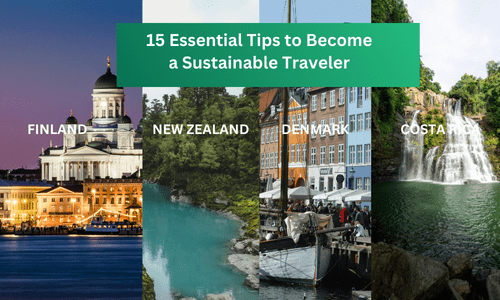This site may contain links to affiliate websites, and I may earn a commission for any purchases made through those links at no additional cost to you.

15 Essential Tips to Become a Sustainable Traveler
15 Essential Tips to Become a Sustainable Traveler
In an era where environmental consciousness is more crucial than ever, sustainable travel has become a significant trend among globetrotters. As travelers, we have the power to make a positive impact on the places we visit while minimizing our ecological footprint. Here are 15 essential tips to help you become a more sustainable traveler:
1. Choose Eco-Friendly Accommodations
Choose accommodations such as hotels, hostels, or lodges that emphasize sustainability.. Look for certifications like LEED or Green Key, which indicate a commitment to environmental practices. These accommodations often implement energy-saving measures, waste reduction strategies, and support local communities.
2. Pack Light and Smart
Traveling light not only makes your journey more comfortable but also reduces fuel consumption in transportation. Pack versatile clothing and bring reusable items like water bottles, shopping bags, and utensils to minimize waste during your trip.
3. Use Sustainable Transportation
Whenever possible, choose eco-friendly transportation options. Use public transit, rent bicycles, or walk to explore your destination. For longer distances, consider trains over planes, as they generally have a lower carbon footprint.
4. Support Local Businesses
Eat at locally-owned restaurants, shop at local markets, and buy souvenirs from local artisans. This approach supports the local economy and reduces the carbon footprint associated with importing goods.
5. Respect Wildlife and Natural Habitats
When exploring nature, stick to marked trails, maintain a safe distance from wildlife, and never feed animals. Select wildlife tours that emphasize animal welfare, conservation efforts, and responsible practices.
6. Conserve Water and Energy
Treat your accommodation like your home. Turn off lights and air conditioning when you leave the room, take shorter showers, and reuse towels and linens when possible.
7. Reduce Plastic Usage
Bring a reusable water bottle and refill it instead of buying bottled water. Avoid using plastic bags and say no to single-use plastics whenever possible.
8. Learn and Respect Local Customs
Research the local culture before your trip and respect local traditions and customs. This includes dressing appropriately, learning a few phrases in the local language, and being mindful of cultural sensitivities.
9. Choose Sustainable Tour Operators
When booking tours or activities, choose operators that prioritize sustainability and give back to local communities. Look for certifications or clear statements about their environmental and social responsibility practices.
10. Offset Your Carbon Footprint
Consider calculating the carbon footprint of your trip and investing in carbon offset programs. These initiatives support projects that reduce greenhouse gas emissions, such as reforestation or renewable energy development.
11. Practice Responsible Photography
Always ask for permission before taking photos of people, especially in culturally sensitive areas. Be mindful of your surroundings and avoid disturbing wildlife or damaging natural habitats for the sake of a photo.
12. Participate in Local Conservation Efforts
Numerous destinations provide opportunities for travelers to engage in conservation projects.. This could include beach clean-ups, tree planting, or wildlife monitoring. These activities allow you to give back to the places you visit and create meaningful travel experiences.
13.Opt for Eco-Friendly Sunscreen and Personal Care Items
When swimming in oceans or lakes, use reef-safe sunscreen to protect marine ecosystems. Choose biodegradable and eco-friendly personal care products to minimize your impact on local water systems.
14. Eat Sustainably
Try local, seasonal, and plant-based foods. These choices often have a lower carbon footprint and support local agriculture. Be mindful of consuming endangered species or unsustainably sourced seafood.
15. Educate Yourself and Others
Stay updated on sustainable travel practices and share your insights with other travelers.. Use social media or travel blogs to promote responsible tourism and inspire others to make sustainable choices.
Implementing Sustainable Travel Practices
Becoming a sustainable traveler doesn’t mean you have to sacrifice comfort or enjoyment. It’s about making mindful choices that reduce your impact on the environment and benefit local communities. Start by incorporating a few of these tips into your next trip and gradually adopt more as you become more comfortable with Sustainable Travel Practices.
Remember, every small action counts. By choosing to travel sustainably, you’re contributing to the preservation of our planet’s natural and cultural heritage for future generations to enjoy.
The Long-Term Benefits of Sustainable Travel
Sustainable travel not only benefits the environment and local communities but also enhances your travel experience. By engaging more deeply with local cultures, supporting conservation efforts, and making environmentally conscious choices, you’ll likely find your travels more rewarding and meaningful.
Moreover, as more travelers adopt sustainable practices, it encourages the tourism industry to shift towards more responsible operations. This collective effort can lead to significant positive changes in popular tourist destinations, preserving their beauty and authenticity for years to come.
In Conclusion,
Sustainable travel is not just a trend—it’s a necessary evolution in how we explore our world. By following these 15 tips, you’ll be well on your way to becoming a more responsible and conscious traveler. So, pack your reusable water bottle, choose your eco-friendly accommodation, and embark on your next adventure with sustainability in mind. Happy and responsible travels!




